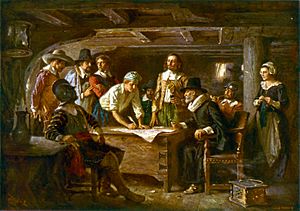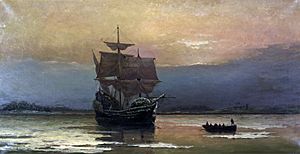Isaac Allerton facts for kids
Isaac Allerton Sr. (born around 1586 – died 1658 or 1659) was a very important passenger on the famous ship Mayflower in 1620. His whole family sailed with him. Isaac Allerton also signed the Mayflower Compact, a key agreement for the new colony.
In Plymouth Colony, he was active in the government and in business. Later, he became involved in trading across the Atlantic Ocean. However, some problems with how he handled the colony's money led to him being criticized and eventually leaving Plymouth. After that, he became a successful businessman in other places and spent his later years living in Connecticut.
Contents
Early Life in England and Leiden
Isaac Allerton was born in Suffolk, England, around 1586. We know this from a statement he made later in 1639. Records from New Amsterdam (which is now New York City) also say he was from Suffolk.
A record from London in 1609 shows an Isaac Allerton as an apprentice. This record suggests he was the son of Bartholomew Allerton, a tailor from Ipswich, Suffolk. An apprentice learns a trade from a skilled worker. Isaac was learning to be a blacksmith.
Life in Leiden, Holland
By 1611, Isaac Allerton was living in Leiden, Holland. He said he was from London, England. His sister, Sarah Allerton, also lived in Leiden. She had a double wedding with Isaac and his wife Mary on November 4, 1611. Sarah married Degory Priest.
Isaac Allerton became engaged to Mary Norris in Leiden in October 1611. He lived near St. Peter's Church. In 1614, he became a citizen of Leiden. While there in 1619, Isaac worked as a tailor. John Hooke, who would later travel with Isaac on the Mayflower, was his apprentice.
The Historic Mayflower Journey
The Allerton family, including Isaac, his wife Mary, their three children, and their apprentice John Hooke, boarded the Mayflower.
The Mayflower left Plymouth, England, on September 6, 1620. It was a small ship, about 100 feet long. There were 102 passengers and about 30-40 crew members. Conditions on board were very crowded.
Challenges at Sea
After about two months, the ship faced strong storms. The ship's wood shook badly, and water leaked in, making passengers wet and sick. There wasn't enough food, and the conditions were not clean. Many people became ill, and sadly, many died, especially women and children. Two people died during the voyage itself.
On November 9, 1620, after about three months at sea, they finally saw land. It was Cape Cod Hook, now called Provincetown Harbor. They tried to sail south to their planned destination in Colony of Virginia, but strong winter storms forced them back. They anchored at Cape Cod Hook on November 11.
Signing the Mayflower Compact

On that same day, the Mayflower Compact was signed. This was an important agreement for how the new colony would be governed. Isaac Allerton was one of the people who signed it. After arriving, almost half the passengers died during the cold, harsh New England winter.
Life in Plymouth Colony
Isaac Allerton's first wife, Mary, and his servant John Hooke died during the first winter in Plymouth. William Bradford, who was a leader in the colony, wrote about Isaac Allerton's family. Isaac's son Bartholomew later married in England. His daughter Remember married in Salem and had children. His daughter Mary married in Plymouth and had four children. Isaac himself married again to Fear Brewster, daughter of William Brewster, and had one son with her. She also passed away, and Isaac married a third time.
Government and Business Roles
The colonists chose John Carver as their first governor. Isaac Allerton served as his assistant from 1621 to 1624. After Governor Carver's early death in April 1621, William Bradford became governor. Isaac continued to serve on the colony's council for civil affairs.
In 1626, Isaac Allerton became involved in the colony's money matters. The Merchant Adventurers, who had funded the trip, needed to be paid back. William Bradford, Isaac Allerton, and others took on the colony's debt. They were given a special right to trade furs to help pay it off.
Isaac Allerton traveled to London in 1626 to make a new agreement with the Merchant Adventurers.
Family Life in Plymouth
In 1627, a record of families and their cattle (like a census) listed Isaac Allerton with his wife Fear and children Bartholomew, Remember, Mary, and Sarah.
Around 1628, a young man named Richard More came to work for Isaac Allerton as an apprentice. Richard was about 15 years old and had a very unusual story. He and his three siblings had been put on the Mayflower in 1620 by their father without their mother knowing. Richard's three siblings died during the first winter, and he was the only one who survived. Richard worked for Isaac for seven years, learning to be a sailor and helping with Isaac's business in Maine.
Business Challenges and Departure
Isaac Allerton returned from England in 1628. He made a payment to the Merchant Adventurers, which helped reduce the colony's debt. He also got permission to set up a trading post at Kennebec (in present-day Maine). The Plymouth colonists built a trading post there, too.
However, Isaac Allerton started having problems with his business dealings. He mixed the colony's money with his own. This caused the colony's debts to grow instead of shrink. He also set up his own trading post at Kennebec, competing with the colony. Because of these issues, it took many years for the colony to pay off its debts.
Isaac Allerton also brought some people from England who caused trouble in the colony. One was John Lyford, who was meant to be a pastor, and another was Thomas Morton, his clerk. Morton was sent away twice for his bad behavior.
By 1630, it was clear that Isaac Allerton had also failed to bring much-needed supplies back from England. He had also set up his own trading post at Pentagoet, near Castine, where the colony also had one. Although he started out helping the colony, he ended up benefiting himself greatly. Because of these problems, he was eventually removed from his position.
In September 1631, Isaac Allerton moved from Plymouth and settled in Salem Harbor. William Bradford wrote that Isaac Allerton "wholly deserted them" (the people of Plymouth Colony) and left them to deal with the problems he had created.
By 1633, Isaac Allerton had another trading post in Machias. But he lost it when England gave most of the Maine coast to France in 1632.
In 1634, many people in the colony died from disease. Among them were Isaac Allerton's wife Fear, and her sister Patience, who was the wife of Thomas Prence (who later became governor).
Later Life in New Amsterdam and New Haven
Isaac Allerton eventually left Massachusetts. He moved to the New Haven Colony. By the 1640s, he had homes in both New Haven and New Amsterdam. New Amsterdam was the capital of the Dutch colony of New Netherland, which is now Lower Manhattan in New York City. He owned property there and became an important person. In 1643, he was appointed to the Eight Men, a group of citizens who advised the governor, Willem Kieft.
By 1646, Isaac Allerton lived in New Haven. He passed away in February 1658 or 1659.
Marriages and Children
Isaac Allerton was married three times:
- Mary Norris: They married in Leiden, Holland, on November 4, 1611. She died in Plymouth on February 25, 1621.
- Fear Brewster: They married in Plymouth Colony around 1625 or 1626. She died in Plymouth before December 12, 1634. She was the daughter of William and Mary Brewster.
- Joanna Swinnerton: They likely married in New Haven, Connecticut, before February 17, 1645. She was still alive in New Haven in May 1684.
Isaac Allerton's Children
From his first wife, Mary Norris:
- Bartholomew Allerton: Born in Leiden, Holland, around 1612 or 1613. He moved back to England and had at least four children. He died in Bramfield, Suffolk, in 1658.
- Remember Allerton: Born in Leiden around 1614 or 1615. She married Moses Maverick and had seven children. She died in Marblehead between 1652 and 1656.
- Mary Allerton: Born in Leiden around 1616 or 1617. She married Thomas Cushman in Plymouth around 1636 and had eight children. She was the last of the original Mayflower passengers to die, passing away on November 28, 1699.
- A child who was buried in Leiden in February 1620.
- A son who was stillborn aboard the Mayflower in Plymouth Harbor in December 1620.
From his second wife, Fear Brewster:
- Sarah Allerton: Born in Plymouth around 1626 or 1627. She most likely died young, before 1651.
- Col. Isaac Allerton Jr.: Born in Plymouth between 1627 and 1630. He graduated from Harvard in 1650. He had two children with his first wife, Elizabeth, and three children with his second wife, Elizabeth. He died in Virginia around 1702. He had a total of 21 grandchildren.
Burial and Legacy
Isaac Allerton died in February 1658 or 1659. His first wife, Mary, is believed to be buried in an unmarked grave at Coles Hill Burial Ground in Plymouth. Many people who died during the first winter were buried there. Her name is on the Pilgrim Memorial Tomb on Coles Hill.
Isaac Allerton's will was presented in court in New Haven in April 1659. His son, Isaac Jr., was asked to manage his father's estate. The will mainly listed debts owed to him and by him.
Notable Connections
George "Joris" Woolsey, who started the Woolsey family in North America, worked for Isaac Allerton at his shop on Pearl Street in Manhattan.
John Hooke, who was about 13 years old, was an apprentice and servant to Isaac Allerton. He was born in Norwich, England, around 1607. His family later moved to Leiden, Holland, and were part of the Separatist Church. John became Isaac's apprentice in 1619. Sadly, Isaac Allerton's wife Mary and their servant John Hooke both died during the first winter in Plymouth.
 | Leon Lynch |
 | Milton P. Webster |
 | Ferdinand Smith |


